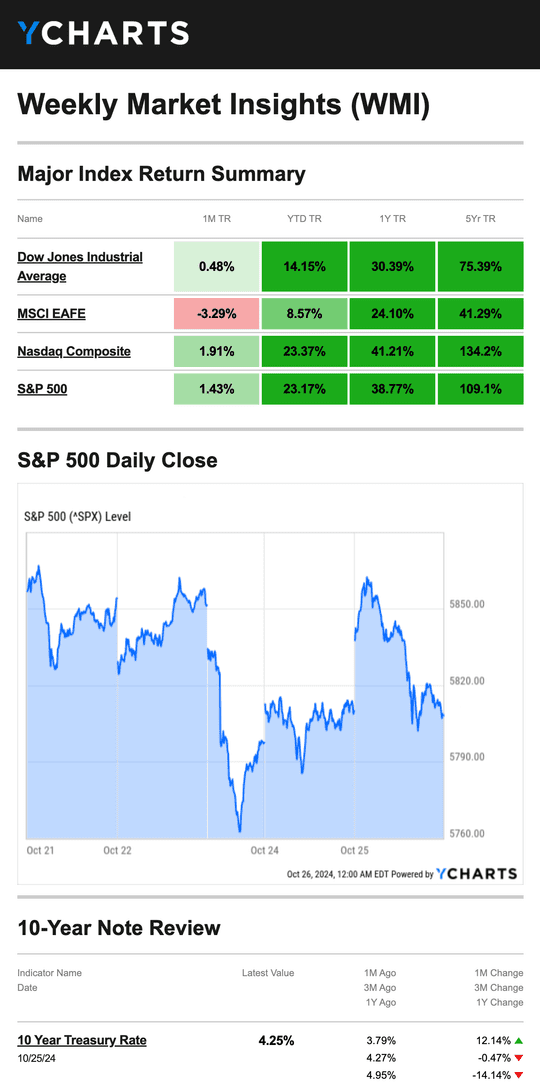Weekly Market Insights | October 28th, 2024
Stocks Mixed Ahead of Election
Stocks were mixed last week as fresh economic data points and election-related uncertainty slowed market momentum.
The Standard & Poor’s 500 Index fell 0.96 percent, while the Nasdaq Composite Index rose 0.16 percent. The Dow Jones Industrial Average dropped 2.68 percent. The MSCI EAFE Index, which tracks developed overseas stock markets, slid 2.30 percent.1,2
Nasdaq Leads
Stocks were mixed for the first half of the week as investors geared up for a steady stream of Q3 reports. The 10-year Treasury yield continued to trend higher, which caught the attention of some traders.
Markets fell Wednesday morning with news that existing home sales fell to a 14-year low in October; still slowed by higher interest rates, sales are on track for their worst year since 1995. Also, pre-election jitters remained an undertow with traders.3,4,5
News that durable goods orders rose in September buoyed sentiment a bit. At Friday’s close, the Nasdaq, fueled by technology names, marked its seventh consecutive week of gains but the S&P 500 broke its 6-week winning streak.6,7

|
|
Election Focus
With the election cycle in full swing, some traders appear to be preparing for an uptick in volatility in the coming weeks.
In late August, nearly 90 percent of stock traded above their 20-day moving average. However, that momentum has slowed. On Tuesday, Standard & Poor’s reported that the number of stocks above their 20-day moving average fell to nearly 50 percent. Traders may be moving to more of a “risk off” position ahead of November 5.8
This Week: Key Economic Data
Tuesday: International Trade in Goods. Consumer Confidence. Case-Shiller Home Price Index.
Wednesday: Gross Domestic Product. Treasury Refunding Announcement. Pending Home Sales. ADP Employment Report.
Thursday: Personal Income and Outlays.
Friday: Employment Situation. ISM Manufacturing Index.
Source: Investors Business Daily – Econoday economic calendar; October 25, 2024
The Econoday economic calendar lists upcoming U.S. economic data releases (including key economic indicators), Federal Reserve policy meetings, and speaking engagements of Federal Reserve officials. The content is developed from sources believed to be providing accurate information. The forecasts or forward-looking statements are based on assumptions and may not materialize. The forecasts also are subject to revision.
This Week: Companies Reporting Earnings
Monday: Waste Management, Inc. (WM)
Tuesday: Alphabet Inc. (GOOG, GOOGL), Visa Inc. (V), Advanced Micro Devices, Inc. (AMD), McDonald’s Corporation (MCD), Pfizer Inc. (PFE)
Wednesday: Microsoft Corporation (MSFT), Meta Platforms, Inc. (META), Eli Lilly and Company (LLY), AbbVie Inc. (ABBV), Caterpillar Inc. (CAT), Amgen Inc. (AMGN), Booking Holdings Inc. (BKNG), Automatic Data Processing, Inc. (ADP), Starbucks Corporation (SBUX)
Thursday: Apple Inc. (APPL), Amazon.com, Inc. (AMZN), Mastercard Incorporated (MA), Merck & Co., Inc. (MRK), Uber Technologies, Inc. (UBER)
Friday: Berkshire Hathaway (BRK.A, BRK.B), Exxon Mobil Corporation (XOM), Chevron Corporation (CVX)
Source: Zacks, October 25, 2024 Companies mentioned are for informational purposes only. It should not be considered a solicitation for the purchase or sale of the securities. Investing involves risks, and investment decisions should be based on your own goals, time horizon, and tolerance for risk. The return and principal value of investments will fluctuate as market conditions change. When sold, investments may be worth more or less than their original cost. Companies may reschedule when they report earnings without notice.

Food for Thought…
“Keep your thoughts free from hate, and you need have no fear from those who hate you.”
– George Washington Carver
Tax Tip…
Is Your Office in a Historic Building? You May Be Eligible for a Tax Credit
To protect heritage sites and other history, the IRS implemented its rehabilitation tax credit, which offers an incentive to renovate and restore old or historic buildings. Here are some of the highlights to help you determine whether your building is eligible:
- The credit may pay 20 percent of the qualifying costs of rehabilitating a historic building.
- This 20 percent needs to be spread out over five years.
- The credit doesn’t apply to the purchase of the building.
- Taxpayers use Form 3468, Investment Credit, to claim the rehabilitation tax credit.
Although this credit might not significantly improve many situations, it’s still a step toward preserving our country’s history.
This information is not a substitute for individualized tax advice. Please discuss your specific tax issues with a qualified tax professional.
Tip adapted from IRS9
Healthy Living Tip…
Neck and Shoulder Stretches for Desk Potatoes
Many of us sit at a desk for hours a day and stare at a screen. These easy desk stretches can help:
- Overhead side stretch: Put your arms over your head and lean in one direction while sitting up straight. Repeat on the other side.
- Side-neck stretch: Gently put your hand on the back of your head and guide it to your chest. Then, instead of putting your head straight down, turn it slightly by looking at your thigh.
- Neck-roll stretch: Relax and lean your head forward. Slowly roll your head to one side and hold for about 10 to 20 seconds, then slowly roll it to the other side.
- Upper-trap stretch: Gently pull your head toward each shoulder. Hold on each side for 10 to 20 seconds.
Tip adapted from Healthline10

Weekly Riddle…
How many times can you subtract the number 75 from 7,500?
Last week’s riddle: How could Gail drive her car from Cleveland to Miami with a flat tire?
Answer: Her spare tire was flat, not any of the four tires she was driving on.
Photo of The Week…

Humpback whale (Megaptera novaeangliae) breaching among of icebergs at Ilulissat Icefjord
Unesco World Heritage Site, Greenland
,
Footnotes And Sources
1. The Wall Street Journal, October 25, 2024
2. Investing.com, October 25, 2024
3. MarketWatch.com, October 23, 2024
4. The Wall Street Journal, October 23, 2024
5. The Wall Street Journal, October 23, 2024
6. ABA Banking Journal, October 25, 2024
7. CNBC.com, October 25, 2024
8. The Wall Street Journal, October 25, 2024
9. IRS.gov, April 30, 2024
10. Healthline, July 24, 2024
Investing involves risks, and investment decisions should be based on your own goals, time horizon, and tolerance for risk. The return and principal value of investments will fluctuate as market conditions change. When sold, investments may be worth more or less than their original cost.
The forecasts or forward-looking statements are based on assumptions, may not materialize, and are subject to revision without notice.
The market indexes discussed are unmanaged, and generally, considered representative of their respective markets. Index performance is not indicative of the past performance of a particular investment. Indexes do not incur management fees, costs, and expenses. Individuals cannot directly invest in unmanaged indexes. Past performance does not guarantee future results.
The Dow Jones Industrial Average is an unmanaged index that is generally considered representative of large-capitalization companies on the U.S. stock market. Nasdaq Composite is an index of the common stocks and similar securities listed on the NASDAQ stock market and is considered a broad indicator of the performance of technology and growth companies. The MSCI EAFE Index was created by Morgan Stanley Capital International (MSCI) and serves as a benchmark of the performance of major international equity markets, as represented by 21 major MSCI indexes from Europe, Australia, and Southeast Asia. The S&P 500 Composite Index is an unmanaged group of securities that are considered to be representative of the stock market in general.
U.S. Treasury Notes are guaranteed by the federal government as to the timely payment of principal and interest. However, if you sell a Treasury Note prior to maturity, it may be worth more or less than the original price paid. Fixed income investments are subject to various risks including changes in interest rates, credit quality, inflation risk, market valuations, prepayments, corporate events, tax ramifications and other factors.
International investments carry additional risks, which include differences in financial reporting standards, currency exchange rates, political risks unique to a specific country, foreign taxes and regulations, and the potential for illiquid markets. These factors may result in greater share price volatility.
Please consult your financial professional for additional information.
This content is developed from sources believed to be providing accurate information. The information in this material is not intended as tax or legal advice. Please consult legal or tax professionals for specific information regarding your individual situation. This material was developed and produced by FMG Suite to provide information on a topic that may be of interest. FMG is not affiliated with the named representative, financial professional, Registered Investment Advisor, Broker-Dealer, nor state- or SEC-registered investment advisory firm. The opinions expressed and material provided are for general information, and they should not be considered a solicitation for the purchase or sale of any security.
Copyright 2024 FMG Suite.